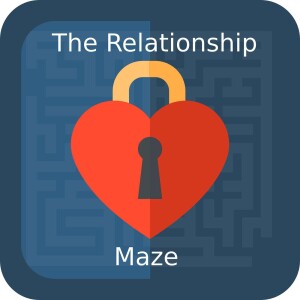
Managing Anxiety- Why It is Not What We Want But What We Might Need
 2023-01-30
2023-01-30
Send us a text
Would you like to discover your conflict style in relationships? Discover how it can help you in your relationships, https://therelationshipmaze.com/relationshipconflictvsl2.
Today we are talking about generalised anxiety - how you might experience it, how it impacts on you and your relationships and what to do about this unpleasant sensation.
Anxiety is a normal response. It is part of our inbuilt biological defense system. It activates our autonomic nervous system and makes us experience a number of physiological symptoms such as a pounding heart, racing thoughts, tension in our stomach clammy hands. Anxiety presents as a feeling in our body as well as a series of thoughts. Unlike fear which is associated with an immediate fight/flight response to a real situation that is threatening, anxiety is the anticipatory apprehension of an event that brings uncertainty or imagined unpleasantness. Fear is what you feel during a battle, anxiety is the anticipation of the battle the night before. Anxiety alerts us to the fact that trouble may lie ahead.
Anxiety can be grounded in adverse experience and it can lead to anticipatory anxiety. You might develop a fear of the fear.
In today's discourse there is a lot talk about anxiety as a dis-ease. The underlying assumption is that anxiety is bad for you, you shouldn't feel it and might have to medicate against it. While anxiety is often experienced as highly unpleasant, it can serve a helpful function. It tells us that we need to spring into action and it can act as a motivational system.
At other times, high levels of anxiety in response to a perceived, imagined threat can get us into an avoidant response. The avoidance in turn reinforces the idea that there really is something threatening about this situation. The more you avoid the situation, the more you are telling yourself that there really is something scary about this situation. A feedback loop is created that gets us stuck.
We talk about early attachment wounds and how they foster anxiety which then plays out in your relationships, either through an excessive need to be reassured by your partner or through high levels of avoidance of emotional intimacy.
We also discuss what you might do to develop a different relationship with your anxiety.
Related episodes:
Why Anxiety Is Good For You - In Conversation With Dr Tracy Dennis-Tiwary
Anxiety and how to manage it
Contact us for information about individual counselling/psychotherapy, couples therapy, clinical supervision or CPD training.
Tom's website
Angela's website
Struggling with a lot of conflict and arguments in your relationship? Learn about communicating effectively and addressing common relationship problems in our Stop Arguing, Start Loving mini course.
Learn everything you always wanted to know about building and maintaining loving relationships in our comprehensive course The Relationship Maze, starting with understanding yourself in relationships to understanding your partner and understanding what makes for a successful relationship. We look at common causes of relationship problems and offer solutions. Learn how to address relationship problems and questions without breaking up.
More Episodes
 2022-10-10
2022-10-10
 2022-10-03
2022-10-03
 2022-09-26
2022-09-26
 2022-08-08
2022-08-08
 2022-07-11
2022-07-11
Create your
podcast in
minutes
- Full-featured podcast site
- Unlimited storage and bandwidth
- Comprehensive podcast stats
- Distribute to Apple Podcasts, Spotify, and more
- Make money with your podcast
It is Free
- Privacy Policy
- Cookie Policy
- Terms of Use
- Consent Preferences
- Copyright © 2015-2024 Podbean.com




